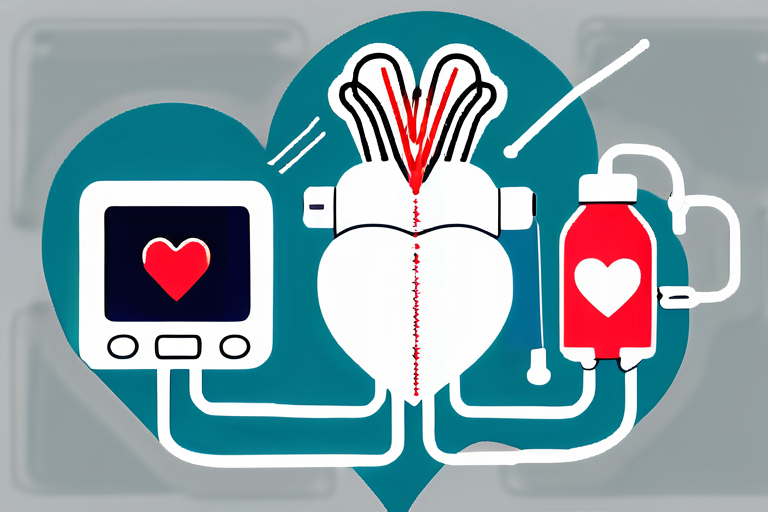Understanding the Causes and Treatments of Hypertension

Hypertension, commonly known as high blood pressure, is a condition that affects millions of people worldwide. It is a serious health concern that can lead to various complications if left unmanaged. In this article, we will delve into the causes of hypertension, explore its symptoms and diagnostic methods, discuss available treatment options, and provide insights on living with this condition.
What is Hypertension?
Hypertension is a medical term used to describe the consistent elevation of blood pressure. Blood pressure is the force exerted by the blood against the walls of the arteries as it flows through them. When this force exceeds the normal range consistently, it can lead to hypertension.
It is important to note that hypertension is often referred to as the "silent killer" because it typically does not present any symptoms until it has reached a severe stage. This is why regular blood pressure monitoring is crucial in detecting and managing hypertension early on.
Defining Hypertension
Hypertension is typically classified into two categories: primary hypertension and secondary hypertension. Primary hypertension refers to high blood pressure that does not have any identifiable cause. Secondary hypertension, on the other hand, is caused by an underlying health condition such as kidney disease or hormonal disorders.
Primary hypertension is the most common type and is often influenced by lifestyle factors such as diet, exercise, and stress levels. Secondary hypertension, on the other hand, requires addressing the underlying health issue to manage blood pressure levels effectively.
The Role of Blood Pressure in Hypertension
Blood pressure is measured using two values: systolic pressure and diastolic pressure. The systolic pressure represents the force exerted on arterial walls when the heart contracts, while the diastolic pressure reflects the pressure when the heart is at rest between beats. Hypertension is diagnosed when these values consistently exceed the normal range.
It is crucial to understand that hypertension is a major risk factor for cardiovascular diseases such as heart attacks and strokes. Managing hypertension through lifestyle modifications, medication, and regular monitoring is essential in reducing the risk of these serious complications.
The Causes of Hypertension
Understanding the causes of hypertension is crucial in effectively managing this condition. While the exact cause of primary hypertension remains unknown, several contributing factors have been identified.

Hypertension, commonly known as high blood pressure, is a multifactorial condition influenced by genetic, lifestyle, and environmental factors. By delving deeper into these factors, healthcare professionals can better tailor treatment plans to address the root causes of elevated blood pressure.
Genetic Factors in Hypertension
Research suggests that genetics play a role in the development of primary hypertension. Individuals with a family history of hypertension are at a higher risk of developing the condition themselves. Genetic variations can affect blood vessel function, hormonal regulation, and kidney function, all of which contribute to the development of hypertension.
In addition to familial predispositions, emerging studies are exploring the role of epigenetics in hypertension. Epigenetic modifications, which can influence gene expression without altering the underlying DNA sequence, may provide further insights into the heritability of high blood pressure.
Lifestyle Factors Contributing to Hypertension
Lifestyle choices have a significant impact on blood pressure levels. Poor dietary habits, such as the consumption of high-sodium and high-fat foods, can increase the risk of developing hypertension. Lack of physical activity, excessive alcohol consumption, and tobacco use are additional lifestyle factors that contribute to high blood pressure.
Moreover, chronic stress and inadequate sleep patterns have been increasingly recognized as lifestyle factors that can contribute to the development and exacerbation of hypertension. The body's response to stress, characterized by the release of stress hormones like cortisol and adrenaline, can lead to sustained high blood pressure if not effectively managed.
Underlying Health Conditions and Hypertension
Secondary hypertension is often caused by an underlying health condition. Kidney disease, hormonal disorders like hyperthyroidism or Cushing's syndrome, and certain medications can all lead to elevated blood pressure levels. Proper diagnosis and management of these conditions are essential in controlling hypertension in such cases.
Furthermore, conditions such as obstructive sleep apnea and chronic kidney disease have been identified as significant contributors to secondary hypertension. Understanding the complex interplay between these underlying health conditions and high blood pressure is crucial in providing comprehensive care for individuals with hypertension.
Symptoms and Diagnosis of Hypertension
Identifying the symptoms of hypertension and undergoing appropriate diagnostic tests are crucial steps in effectively managing this condition.
Understanding the complexities of hypertension is essential for individuals seeking to maintain their cardiovascular health. Hypertension, also known as high blood pressure, is a condition where the force of blood against the artery walls is consistently too high, usually above 130/85 mmHg. This persistent elevation in blood pressure can lead to serious health complications, such as heart disease, stroke, and kidney damage. While hypertension is often asymptomatic, it is vital to recognize any potential signs and risk factors to prevent long-term consequences.
Recognizing the Symptoms of Hypertension
Hypertension is commonly referred to as the "silent killer" because it often presents no noticeable symptoms. However, some individuals may experience symptoms such as headaches, dizziness, blurred vision, and shortness of breath. Regular blood pressure monitoring is crucial, especially for individuals at high risk or with a family history of hypertension.
Furthermore, lifestyle factors such as diet, exercise, and stress management play a significant role in the development and management of hypertension. A balanced diet low in sodium and high in fruits, vegetables, and whole grains can help regulate blood pressure. Engaging in regular physical activity and implementing stress-reducing techniques like meditation or yoga can also contribute to overall cardiovascular health.
Diagnostic Tests for Hypertension
Diagnosing hypertension involves measuring blood pressure and assessing overall health. A healthcare professional may use a sphygmomanometer, a device that measures blood pressure, to determine if levels are within a healthy range. Additionally, other tests may be conducted to identify potential underlying causes of hypertension.
It is important to remember that hypertension can be influenced by various factors, including genetics, age, and lifestyle choices. By working closely with healthcare providers and adopting healthy habits, individuals can effectively manage their blood pressure and reduce the risk of associated complications.
Treatment Options for Hypertension
Fortunately, hypertension can be effectively managed through a combination of medication, lifestyle changes, and surgical interventions if necessary.
When dealing with hypertension, it is crucial to understand the various treatment options available to effectively control high blood pressure. By exploring a combination of medication, lifestyle adjustments, and in some cases, surgical interventions, individuals can work towards achieving optimal blood pressure levels and reducing the risk of associated complications.
Medications for Managing Hypertension
Various medications are available to help manage hypertension. These medications work by either relaxing blood vessels, reducing the volume of blood in circulation, or interfering with certain hormone pathways. It is important to work closely with a healthcare professional to determine the most suitable medication and dosage.
From angiotensin-converting enzyme (ACE) inhibitors and beta-blockers to diuretics and calcium channel blockers, the realm of hypertension medications offers a diverse range of options to address individual needs. Each type of medication functions uniquely in the body to target different aspects of blood pressure regulation, highlighting the importance of personalized treatment plans tailored to each patient's specific condition.
Lifestyle Changes to Control Hypertension
Lifestyle modifications play a crucial role in managing hypertension. A healthy diet consisting of fruits, vegetables, whole grains, and lean proteins can help lower blood pressure. Regular physical activity, weight management, limited alcohol consumption, and smoking cessation are also essential in controlling hypertension.
Embracing a heart-healthy lifestyle goes beyond just dietary adjustments; it encompasses a holistic approach to overall well-being. Engaging in stress-reducing activities such as yoga or meditation, ensuring an adequate amount of quality sleep, and fostering strong social connections can all contribute to better blood pressure management and improved cardiovascular health.
Surgical Interventions for Severe Hypertension
In rare cases where hypertension is severe and resistant to other treatment methods, surgical interventions may be necessary. Procedures such as renal denervation and bariatric surgery can help lower blood pressure by targeting specific underlying causes or promoting weight loss.
For individuals facing severe and uncontrolled hypertension, the prospect of surgical intervention may offer a glimmer of hope in achieving better blood pressure control. These procedures, often reserved for cases where other avenues have been exhausted, require a multidisciplinary approach involving skilled healthcare professionals to ensure the best possible outcomes for patients.
Living with Hypertension
While hypertension requires lifelong management, individuals can lead fulfilling and healthy lives with the right approach.
Daily Management of Hypertension
Regular monitoring of blood pressure, adherence to medication regimen, and embracing a healthy lifestyle are critical in daily hypertension management. Establishing a support system, staying informed about the condition, and seeking emotional support when needed can also contribute to overall well-being.
Long-Term Prognosis for Individuals with Hypertension
With proper management, many individuals with hypertension can lead long and healthy lives. It is important to regularly consult with healthcare professionals, monitor blood pressure, and adjust treatment plans as necessary to prevent complications and maintain optimal health.
Hypertension and Mental Health
Hypertension can have an impact on mental health. Dealing with a chronic condition can be challenging and may lead to feelings of anxiety, stress, or depression. Seeking professional help and incorporating stress-reduction techniques into daily life can significantly improve mental well-being for individuals living with hypertension.
Furthermore, it is important to recognize that hypertension is not just a physical condition, but also has psychological implications. The emotional toll of managing a chronic illness can be overwhelming at times. Individuals may experience a range of emotions, from frustration to fear, as they navigate the complexities of hypertension management.
One effective strategy for coping with these emotional challenges is to build a strong support system. This can include family members, friends, or support groups who understand the unique struggles faced by individuals with hypertension. Sharing experiences, seeking advice, and receiving encouragement from others who are going through similar journeys can provide a sense of belonging and alleviate feelings of isolation.
In addition to emotional support, staying informed about the latest research and treatment options can empower individuals to take an active role in their healthcare. By staying up-to-date with medical advancements, individuals can have informed discussions with their healthcare providers, ask relevant questions, and make well-informed decisions about their treatment plans.
Lastly, it is crucial to prioritize self-care and incorporate stress-reduction techniques into daily life. Engaging in activities such as meditation, deep breathing exercises, or engaging in hobbies can help individuals manage stress levels and improve overall well-being. Taking time for oneself and engaging in activities that bring joy and relaxation can have a positive impact on mental health.
In conclusion, understanding the causes and treatments of hypertension is essential in effectively managing this condition. By making necessary lifestyle changes, adhering to prescribed medication regimens, and closely monitoring blood pressure levels, individuals can live healthy lives while keeping hypertension under control. Remember, seeking professional medical advice and support is paramount in managing and living well with hypertension.
Thanks for reading.
BestPharmaReviews.



